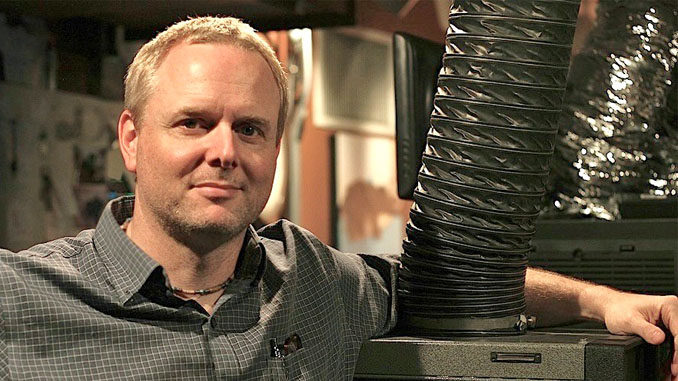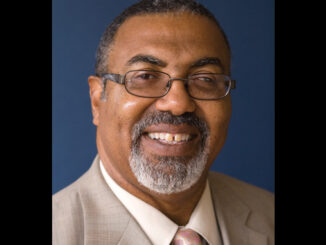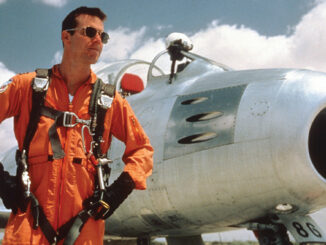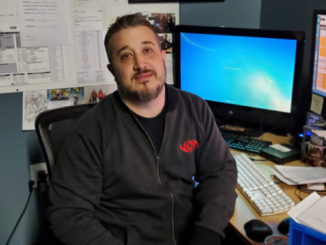
Where are you currently employed?
The American Film Institute (AFI) in Los Angeles.
Current Project?
Performing routine maintenance on our screening rooms and equipment, and preparing for the upcoming school year.
Describe Your Job.
Working mainly in our larger screening room, I project one or two 35mm feature films weekly throughout the school year for classes, and I audio record seminars with industry guests. These seminars follow screenings that are generally new releases on DCP (Digital Cinema Package). I also screen the Fellows’ weekly cycle projects and, ultimately, their thesis films — all on digital formats.
How did you first become interested in this line of work?
I grew up, loosely speaking, in Boston. One day, a friend handed me a book on screenwriting, and I thought, “Hey, I could do this.” I began writing, took some filmmaking classes and workshops, and worked some thankless free gigs on film sets.
My first grip job was a nightmare; the gaffer was a hellion and the director was neglectful. We weren’t being paid, so we were literally working for food. Yet the director would provide only one pizza for six guys, near the end of a 15-hour day. We’d be dejected and famished, drawing straws to see who got a second slice, as if we were POWs rationing the last tin of sardines in a World War II movie. The title of our movie would have been “Six Guys, Eight Slices.”
Who gave you your first break?
Around this time, I was volunteering at a non-profit movie house, stuffing envelopes in a cramped office, with a woman who snacked endlessly on liverwurst and limburger. One day, my boss informed me that they needed another projectionist and asked if I was interested. I’d shot and edited my own 16mm shorts, and I’ve always been technically inclined — I had worked as an electrician and a CATV technician — so I jumped ship from the odoriferous office to the wonderific projection booth.
There were two theatres: one booth was on the ground floor, the other was a tiny penthouse. I ran two 35mm features concurrently, traversing a fire escape for changeovers. When I moved to LA, I got a job at AFI as a temp. In time, a projectionist position opened up and it was offered to me, based on my previous experience.
Working mainly in our larger screening room, I project one or two 35mm feature films weekly throughout the school year for classes, and I audio record seminars with industry guests.
What was your first union job?
AFI.
Which of your credits or projects have made you the most proud and why?
A few years back, following a screening of a 35mm print of E.T., cinematographer Allen Daviau was in the house as a guest. When the lights came up, the first thing he said was, “How about a hand for the projectionist?” A brief round of applause ensued. It was a classy move by such a distinguished craftsman. I felt like an art gallery employee being lauded by Vermeer for hanging The Milkmaid. I mean displaying the painting, not hanging the milkmaid. I’d be arrested for that…
What was your biggest challenge in your job (or on a particular project) and how did you overcome/solve it?
In this digital age, the challenge is to be prepared when the machines develop a mind of their own. DCP is a stable format, but I’m wary of anything that’s file-based or optical, ie, Blu-ray. Failures are rare, but the potential exists. Any time I run something file-based or Blu-ray, I start a digital timer on my computer, in case a crash occurs. Someday, I fear a mid-screening crash will occur and I’ll go to pause my timer, only to be met by an evil smiley face and villainous laughter. It’s likely the HAL 9000 screensaver feeding my paranoia. My computer’s eerily genial manner and masterful chess skills are no cause for concern.
I’ve experienced failures with 35mm: A motor burns out, a relay fails, a film breaks. A few times, the belt on the take-up reel broke mid-screening, so I knelt down and wound the reel with my finger until the next changeover.
During my first week as a projectionist in Boston, we rented a 16mm projector and something went wrong shortly after the show commenced, so I stopped the projector — without closing the dowser. I burned a frame, on screen. Some 450 people in the theatre gasped in horror as if they’d just witnessed a murder. In a sense, they had. To my relief, the filmmaker came into the booth as I was rectifying the problem; she was immensely calm and matter-of-fact about the burnt frame. She was a documentarian. They’re good like that.
A few years back, following a screening of a 35mm print of E.T., cinematographer Allen Daviau was in the house as a guest. When the lights came up, the first thing he said was, “How about a hand for the projectionist?”
What was the most fun you’ve had at work?
I’ll never tell.
Jobwise, what do you hope to be doing five years from now?
Working.
What are your outside activities, hobbies, passions?
I love dogs, though I can’t have one in my current apartment. I also like to cook; I make a killer pea soup. I’ve recently tried online dating, though that’s less of a hobby and more of a hazing process. I seem to be attracting nothing but sycophants. Perhaps MealTicket wasn’t the best choice of screen name. I hope BornYesterday is still available.
I occasionally play with musical instruments, and I enjoy watching my home sports teams. I moved to LA in 2000, and the Boston/New England teams started winning all of those titles as soon as I left town. For that reason, nobody wants me back.
Favorite movie(s)? Why?
Rocky is a perfectly executed film, with a lot of heart. It has a great story, unforgettable characters, the best movie theme of all time, a dog named Butkus, and the late, great Joe Spinell. The film still holds up well. I first saw it in my youth, at the Broadway Cinema in Southie’s Lower End. The theatre was known for generations as the Bughouse because it was infested with roaches. “Yo, Adrian — bug spray!”
Favorite TV program(s)? Why?
The last series I followed was The Shield. Excellent show. I don’t watch anything new — I haven’t had cable/satellite for over a decade, only broadcast TV. I mostly watch documentary and true crime: Forensic Files, etc. At night, I tune in to Johnny Carson or Dick Cavett reruns. Cavett always had an eclectic panel of guests. On any given night, he might have F. Lee Bailey, Tony Curtis and Federico Fellini, all on one show. When do those three get together in a room? Answer: January 14, 1970.
Do you have an industry mentor?
My boss, John Le Grande.
What advice would you offer to someone interested in pursuing your line of work?
Learn by doing.
Was there ever a circumstance when you had to rely on the Guild for help or assistance?
Years ago, I went back to Boston for a year, then came back to LA. When I returned to work, I found that I’d not officially suspended my membership during my absence. There were complications. Cathy Repola was very gracious and accommodating, and I am forever grateful for her assistance.
Is there anything you’d like to say to your fellow Guild members, some words of encouragement?
Fight the good fight.
Compiled by Edward Landler
Editor’s Note: To recommend a member (including yourself) to be featured on the home page of the Editors Guild website, contact edlandler@roadrunner.com






